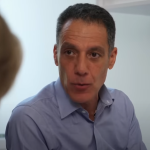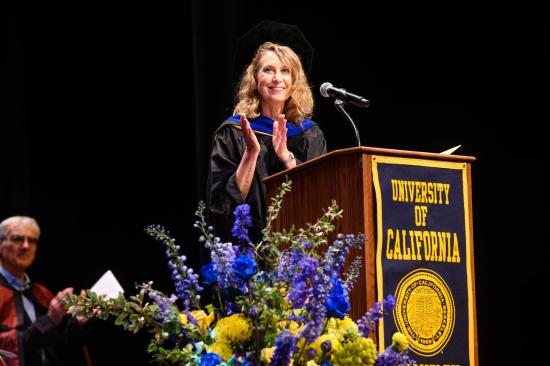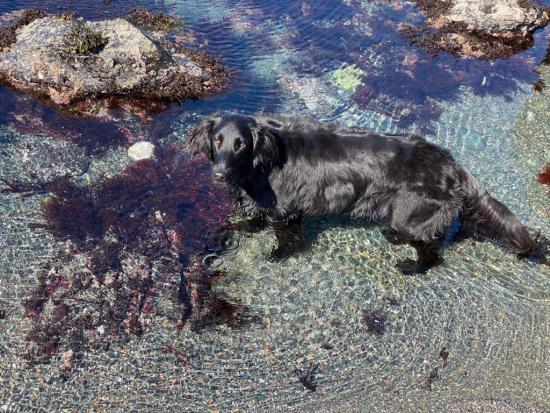On July 1, 2023, Professor Marti Hearst, previously head of school, became the I School’s dean for the upcoming academic year. Hearst, who was appointed head of school in 2022, stepped into this new role after Jennifer Chayes became dean of the new College of Computing, Data Science, and Science on July 1, 2023. We spoke with Hearst about her plans for the year, her thoughts on current trends in information, data science, and cybersecurity, and what she does in her spare time.
What are your top priorities for this next year as interim dean? What is your highest priority? What are you looking forward to?
Our top priority is to hire an outstanding dean during the coming academic year. Our second is to hire faculty and researchers; we are doing a joint search for a new faculty member in technology policy with the Goldman School of Public Policy (GSPP), and I’d like to expand our footprint in the area of AI/technology for good.
Third, with Kristen Williams, our fabulous assistant dean of external affairs, we want to increase philanthropy for fellowships and other forms of student aid, and increase our contact with our brilliant alumni. As part of that, I’m really interested in continuing the effort to bolster our community both online and in person. We will continue to have stimulating events and activities to help reinforce our community.
I’m also trying to make various internal processes more efficient, and ensure we have the right staff in place when the new dean arrives.
Another priority is building a mutually beneficial relationship with [the College of Computing Data Science and Society (CDSS)]; this includes a plan for supporting undergraduate teaching with CDSS. We’re also building a collaboration with the Goldman School on Public Policy (GSPP) on Technology Policy, and helping the School of Journalism launch their online degree.
What do you see as the I School and Berkeley’s biggest challenge within the next five years?
First, let’s talk about what is working really well. We have fantastic faculty doing outstanding research that changes the world for the better. We have three very healthy master’s programs, with fantastic students who get great outcomes, and expert instructors from a wide range of disciplines. We have terrific staff, and our finances are in order and healthy. And we have a warm community with a mission to improve the world both with technology and while questioning technology.
In terms of challenges, as I mentioned above, our main challenge is to build up our regular faculty and bring in more researchers. We need more so that we can better support current and future Ph.D. students. We have highly talented, interdisciplinary Ph.D. students, and we need to have a very attractive environment for them.
What are the most important questions/challenges you want to see I School students tackle in the next decade?
I don’t think my role is to tell faculty or students what they should do research on.
A bedrock principle of being at the university is that you get to choose your direction. But I could say our master’s students tend to see what’s going on in the world or come in with some mission of their own and pursue it. I think that’s a great strength of our program.
That said, I want to help grow the exciting areas that our faculty and students are currently working in, including AI for good, promoting true information over misinformation, developing humane and usable user interfaces, expanding digital humanities, and figuring out how data and technology can better address the needs of vulnerable people around the world.
I think in the future we’ll have more people looking into what information technology can do for climate change. Although it's not clear how to do that right now, I know that Professor John Chuang started working in that space. Not just climate, but conservation of resources and better practices in terms of what we produce and consume, by which I mean trying to reduce plastic use, keeping it out of the environment, and trying to help with wildlife and with temperatures.
Healthcare is an ever growing area of interest. A lot of the data science students, and some of the Ph.D. students, are interested in that area, and how data science can help with various aspects of healthcare. I think that area is going to grow.
You were part of the original faculty of the School of Information when it was founded in the mid-1990s. How has it changed over the years and how has it stayed the same?
It’s easier to talk about what stayed the same, which is, I think, our core values of looking at the intersection of technology and humans, either individual people or society, and trying to make a difference via law, policy, and design.
When I started, we introduced human-computer interaction (HCI) into this kind of school, which then spread to the other I Schools. We also started with an interest in economics and technology — our first dean was an economist — and we had people working on technology not for its own sake, but technology to improve the world. We weren’t just critiquing technology, but knowing how it works and building things, which differentiates us from other units on campus that either critique or build, but don't put the two together.
What’s changed are the application areas. Our students get excited about whatever is sort of hot in industry. I remember the automated car surge. They got very excited about blockchain when it came out. Now it's AI’s effect on society that people are very excited about.
We’re very good at addressing the problems of the day with the mindset and the techniques that we've used throughout my time here, be it user-centered design or ethnography, or economics, or understanding political systems and social systems.
Are there any current trends in the information/data science/cybersecurity industry that intrigue you?
My field of natural language processing has been completely subsumed by large language models (ChatGPT) and what’s happening in that space. Just trying to track that while having an administrative job is a challenge.
The areas I’m doing research in are technology that makes it easier to understand and compose scientific papers. I’ve been working on that for several years and with some collaborators, both from the HCI side and the natural language processing side.
And I’ve been really interested in the combination of language and visualization, which I’ve been doing research on with my Ph.D. student Chase Stokes. We think about the intersection of those two, how one influences the other, how it affects how understandable some information is, how persuasive it is, and what kind of biases arise from that.
Now for some more casual questions — what’s a fun fact that people may not know about you?
I love dogs. I have a flat-coated retriever and at one point I raised a service dog, so I learned how to train the dog decently.
What are you reading or watching right now?
Right now, I’m reading a lot of (auto)biographies including Samantha Power’s book Education of an Idealist. I also recently enjoyed Washington: A Life by Ron Chernow; The Six Wives of Henry the VIII by Alison Weir; Solito, by a Guatemalan refugee turned American poet, Javier Zamora; and Trevor Noah’s Born a Crime. One really interesting fiction book I just read was Barbara Kingsolver’s Demon Copperhead which confronts the opioid epidemic in Appalachia. I especially like long books that I can have on audio. So when I’m walking or hiking or driving, just have that on.
In terms of TV, right now we’re watching Borgen, which is about Danish politics and a Danish prime minister. “Borgen” is Danish for “the Castle,” which is their White House equivalent. I like the show because I can relate to many of her (the PM’s) dilemmas.
And there was this one about a father and son called Final Fantasy, Dad of Light. The father doesn’t really talk to his son, but the son plays an immersive video game. Then the father starts playing it, and, unbeknownst to the father, the son assumes a character and helps his father learn the game world; this way they get to know each other.
I also loved the first season of Russian Doll.
Restaurants/places in Berkeley you'd recommend?
Millennium, our vegan restaurant on College [Ave.], is really good. It's expensive though. We take speakers there.
I like to go to Berkeley Repertory Theatre and Aurora and Shotgun [Players] Theatre in Berkeley. I love to go to plays. They have really great prices for students, so people should check that out when they’re here.
And then a hike in our beautiful hills with our dog. That’s why we’re here in Berkeley, right? And then, of course, Berkeley has a variety of creative people, intellectuals, people that are athletic, that are artistic, all in one place.
There are so many people to admire and look up to, and to help you, make you want to strive to be better at what you do. And that’s a great thing about the I School, and a great thing about being at Berkeley, from my perspective.
Anything else you’d like to say?
We have a great community. What I really like about the job is enabling people in the community to do their best work and to be happy in their work and try to reduce the administrative burden and help them succeed.
It’s worth fighting for, and that’s why I’ve agreed to take this role and extend my time in the role, because I feel like I’m really enabling people to be in this great community.









